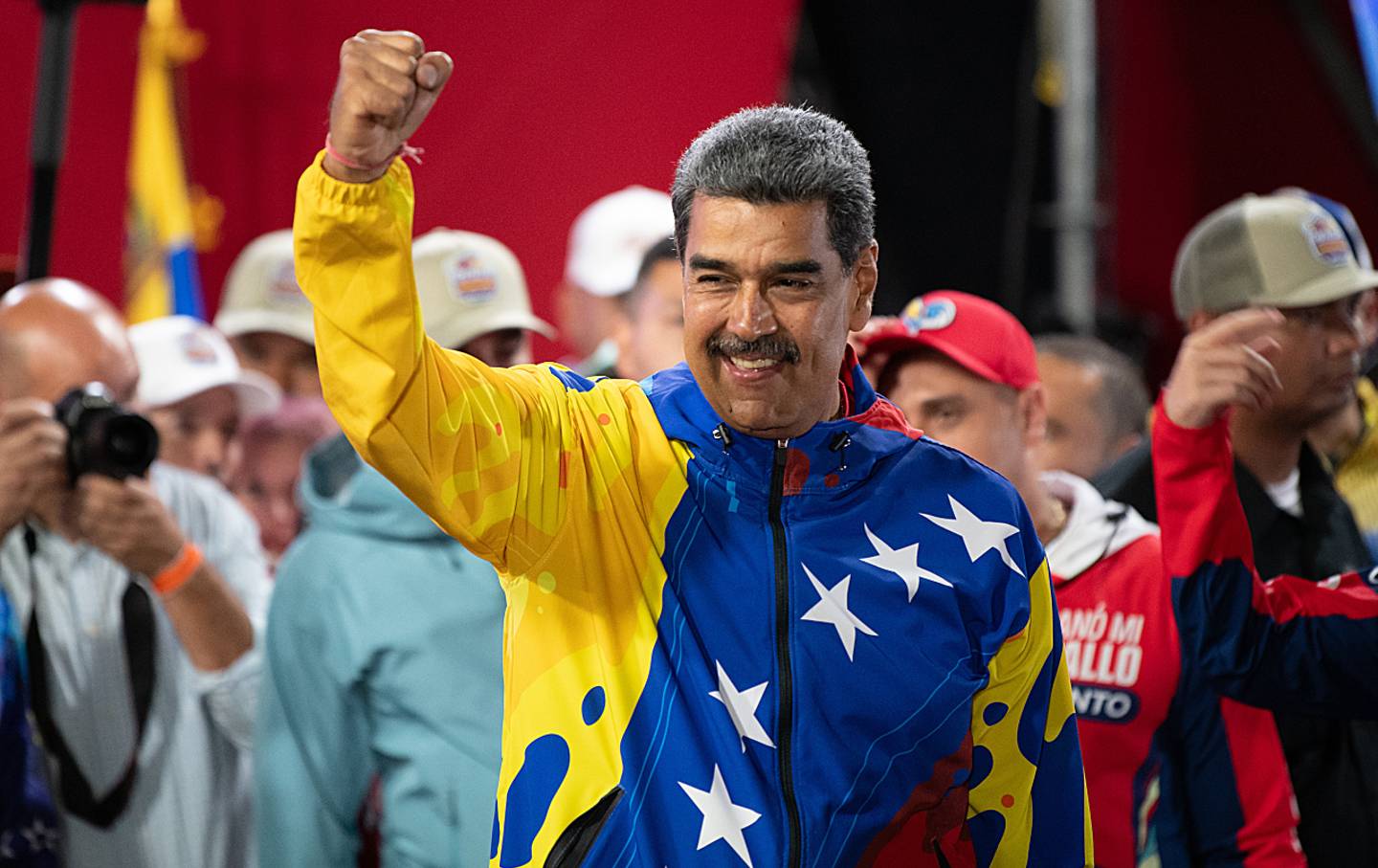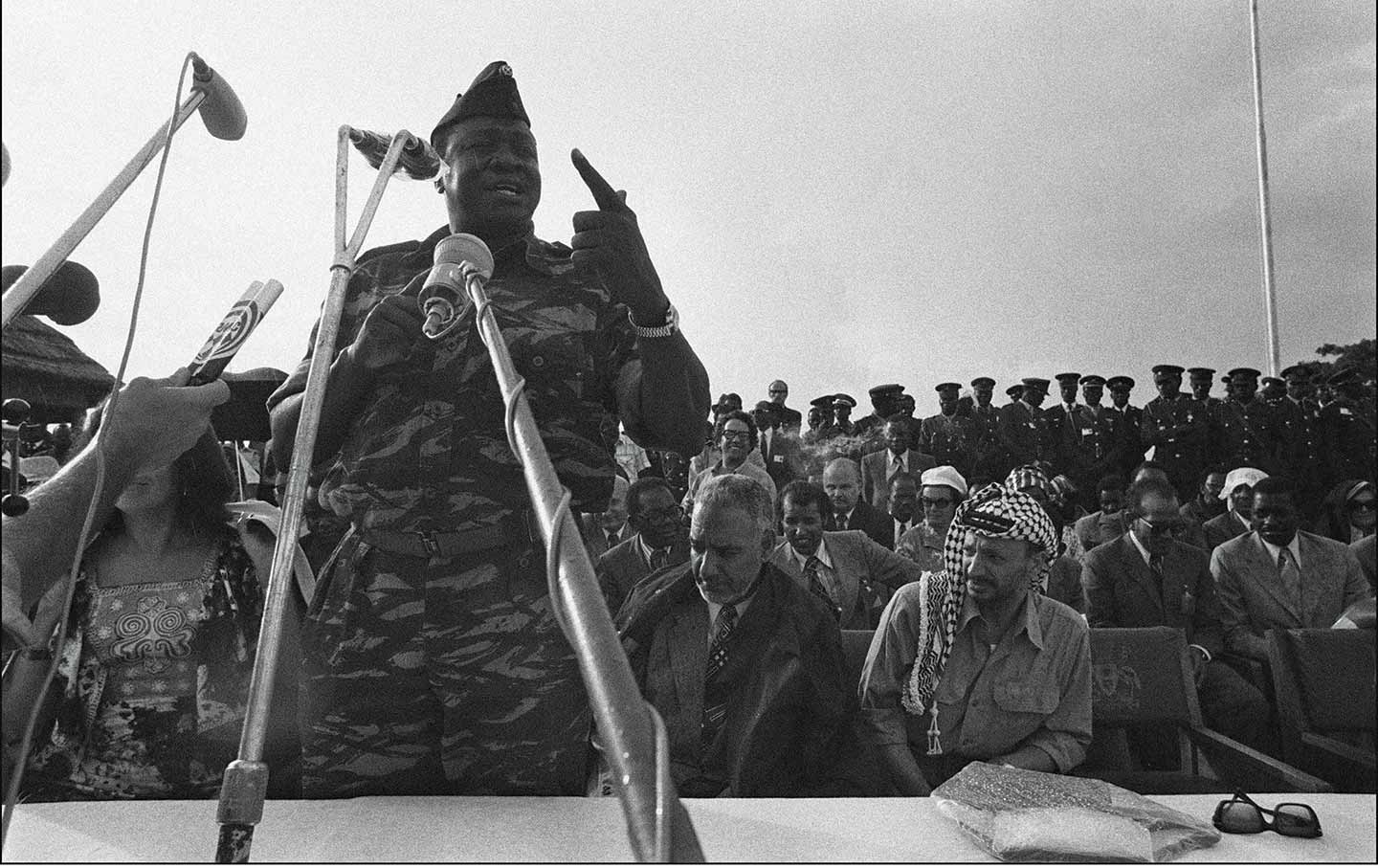The Maduro Government Is Probably Stealing the Election in Venezuela
But maintaining economic warfare by the US—including sanctions—only hurts the Venezuelan people.

Even though the Nicolás Maduro government in Venezuela is almost certainly stealing Sunday’s election, the Biden-Harris administration should still end the harsh US economic warfare against the country.
Here are three reasons:
- After Donald Trump imposed total US sanctions in 2017, a humanitarian disaster soon followed. Mark Weisbrot, a respected economist at the Center for Economic and Policy Research, explains that curtailing Venezuela’s oil exports, and blocking its access to international finance, contributed to an economic collapse that was worse than the Great Depression in the United States. Weisbrot contends that the sanctions helped cause “tens of thousands of additional deaths.”
- Also, maintaining the economic blockade will continue to force millions of desperate Venezuelans into exile. So far, the exodus amounts to nearly 8 million people—of whom several hundred thousand have already showed up at our southern border. This is already by far the worst such upheaval in Latin American history.
- What’s more, the sanctions did not promote democracy. As Jesus “Chuo” Torrealba, a leading opposition figure inside Venezuela, told me in 2022, “The Trump administration believed that if you make people suffer, if you impose the politics of pain, that you will promote a general insurrection. That has not happened. Hungry people do not revolt.”
The Trump policy was not only cruel but also arguably cynical. TheWashington Post just reported that Trump officials knew that imposing total sanctions would force a big jump in the number of Venezuelan refugees. But “chaos at the border” helps the MAGA movement politically, as we’ve just seen with Trump’s sabotage of a bipartisan compromise in Congress that would have made asylum requests at the border more difficult.
Meanwhile, there is clear evidence that Maduro is not playing fair. From the start, the regime tried to stymie the opposition—by disqualifying its original candidate and arresting and harassing campaign workers. Maduro had already sharply restricted the number of outside election monitors, and on the election’s eve the government blocked a planeload of former Latin American leaders from landing to observe the vote. Some leftist presidents in the region have already issued warnings, including Lula da Silva of Brazil and Gustavo Petro from neighboring Colombia.
In the hours just after the government-controlled election authority released questionable results showing that Maduro won, 51 percent to 44 percent, Chile’s leftist leader, Gabriel Boric, tweeted: “The Maduro regime must understand that the results it published are hard to believe. The international community and the Venezuelan people—including millions in exile—demand full transparency.”
The Maduro government also made no effort to allow the Venezuelans in exile—a quarter of the country’s population—to vote.
The Venezuelan election took place amid an ongoing economic catastrophe, a disaster whose scale is not fully grasped outside the country. The Trump sanctions blocked most of the country’s oil exports, and cut it off from international finance. The United States supposedly made exceptions for the import of food and medicines, but global companies steered clear, afraid to run afoul of the American boycott. Mark Weisbrot has the details; he told me that after Trump’s 2017 decree, Venezuela’s economy collapsed by nearly 38 percent, a worse drop than the 29 percent contraction that the US experienced in 1929–33, the first years of the Great Depression. Venezuelan imports dropped by 91 percent, and food imports by 78 percent. The UN’s Food and Agriculture Organization reported that undernourishment rose to 27 percent; it had been under 3 percent a decade earlier. Infant mortality jumped to 21 per 1,000 live births, the second highest in Latin America. Some 82 percent of the population ended up in poverty.
Meanwhile, the global price of oil, Venezuela’s main export, rose, but the country was not able to take advantage.
Calculating additional deaths is necessarily inexact, but Weisbrot used various statistics to estimate that “the number of Venezuelans who have died as a result of the sanctions over just the past six years is at the very least in the tens of thousands, and likely higher.”
In short, Venezuelans are not fleeing their country because they want to change careers and earn more money in other countries. They join the exodus because they are hungry and afraid of getting ill.
The Biden-Harris administration did ease the sanctions somewhat. But Weisbrot says the pressure remains “substantial and damaging.”
There is also the argument that the US sanctions violate the human rights of the Venezuelan people. In May 2021, Representative Jim McGovern, Democrat of Massachusetts, wrote an eloquent letter to President Biden to demand that the economic warfare end:
Economic pain is the means by which the sanctions are supposed to work. But is it not Venezuelan officials who suffer the costs. It is the Venezuelan people.… For people in Venezuela the ongoing crisis is a life and death matter.… I have never believed that sanctions should be used to punish whole populations for the actions of their leaders.
Besides ending the economic sanctions, the United States should just sit back, and say little or nothing. Decades of brutal US interventions in Latin America have destroyed our government’s credibility. Instead, America should concentrate on humanely treating the Venezuelan migrants whom our harsh policy helped create when they reach our southern border. Let Latin Americans, both leaders and ordinary people, continue responding to the crisis. And, for once, let Venezuelans themselves make their own history.
Popular
“swipe left below to view more authors”Swipe →Disobey authoritarians, support The Nation
Over the past year you’ve read Nation writers like Elie Mystal, Kaveh Akbar, John Nichols, Joan Walsh, Bryce Covert, Dave Zirin, Jeet Heer, Michael T. Klare, Katha Pollitt, Amy Littlefield, Gregg Gonsalves, and Sasha Abramsky take on the Trump family’s corruption, set the record straight about Robert F. Kennedy Jr.’s catastrophic Make America Healthy Again movement, survey the fallout and human cost of the DOGE wrecking ball, anticipate the Supreme Court’s dangerous antidemocratic rulings, and amplify successful tactics of resistance on the streets and in Congress.
We publish these stories because when members of our communities are being abducted, household debt is climbing, and AI data centers are causing water and electricity shortages, we have a duty as journalists to do all we can to inform the public.
In 2026, our aim is to do more than ever before—but we need your support to make that happen.
Through December 31, a generous donor will match all donations up to $75,000. That means that your contribution will be doubled, dollar for dollar. If we hit the full match, we’ll be starting 2026 with $150,000 to invest in the stories that impact real people’s lives—the kinds of stories that billionaire-owned, corporate-backed outlets aren’t covering.
With your support, our team will publish major stories that the president and his allies won’t want you to read. We’ll cover the emerging military-tech industrial complex and matters of war, peace, and surveillance, as well as the affordability crisis, hunger, housing, healthcare, the environment, attacks on reproductive rights, and much more. At the same time, we’ll imagine alternatives to Trumpian rule and uplift efforts to create a better world, here and now.
While your gift has twice the impact, I’m asking you to support The Nation with a donation today. You’ll empower the journalists, editors, and fact-checkers best equipped to hold this authoritarian administration to account.
I hope you won’t miss this moment—donate to The Nation today.
Onward,
Katrina vanden Heuvel
Editor and publisher, The Nation
More from The Nation

Mahmood Mamdani’s Uganda Mahmood Mamdani’s Uganda
In his new book Slow Poison, the accomplished anthropologist revisits the Idi Amin and Yoweri Museveni years.

The US Is Looking More Like Putin’s Russia Every Day The US Is Looking More Like Putin’s Russia Every Day
We may already be on a superhighway to the sort of class- and race-stratified autocracy that it took Russia so many years to become after the Soviet Union collapsed.

Israel Wants to Destroy My Family's Way of Life. We'll Never Give In. Israel Wants to Destroy My Family's Way of Life. We'll Never Give In.
My family's olive trees have stood in Gaza for decades. Despite genocide, drought, pollution, toxic mines, uprooting, bulldozing, and burning, they're still here—and so are we.

Trump’s National Security Strategy and the Big Con Trump’s National Security Strategy and the Big Con
Sense, nonsense, and lunacy.

Does Russian Feminism Have a Future? Does Russian Feminism Have a Future?
A Russian feminist reflects on Julia Ioffe’s history of modern Russia.

Ukraine’s War on Its Unions Ukraine’s War on Its Unions
Since the start of the war, the Ukrainian government has been cracking down harder on unions and workers’ rights. But slowly, the public mood is shifting.


